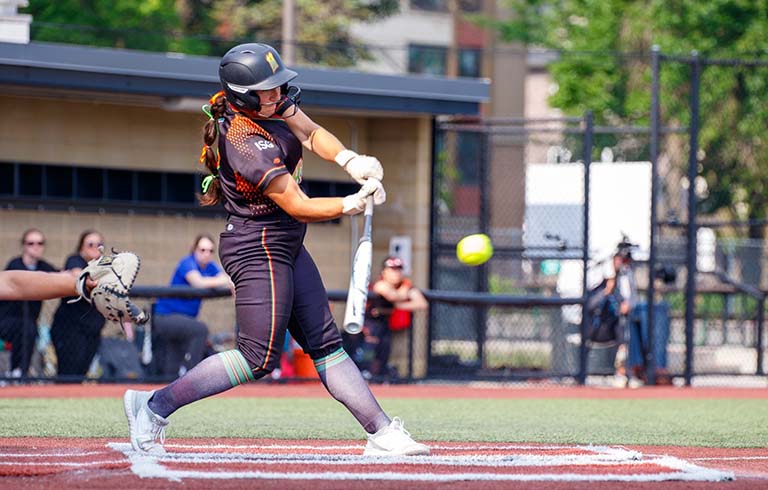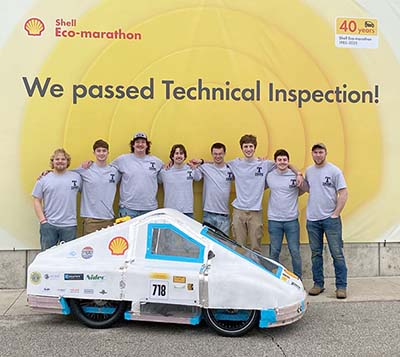
The game goes on: Trine softball players enjoy summer with Habaneros
For two members of Trine University’s softball team, play didn’t end with the national championship in June.
April 22, 2025

“It was a huge relief and a proud moment,” said team member Evan Straske, a mechanical engineering major from Huntington Woods, Michigan. “After all the hours of design, building and troubleshooting, getting that sticker felt like a victory in itself. It validated our work and confirmed that we had built something safe, reliable and competition-ready.”
The team took part in the regional competition held at Indianapolis Motor Speedway from April 2-6.
Ultra-energy-efficient cars
The Shell Eco-marathon is described as one of the world’s leading energy-efficiency engineering programs.
Encompassing high school and college teams, the annual competition challenges students to build their own ultra-energy-efficient cars and take them out on the track in competition.
Trine’s entry was the university’s first in the Urban Electric category since 2022.
Powered by a battery or a hydrogen fuel cell, Urban Electric vehicles must be designed with city driving in mind while considering human needs such as driver comfort and space for luggage. They also must include elements such as four wheels and a windshield wiper while seeking to provide maximum energy efficiency.
Trine competed with other battery-powered vehicles.
In addition to Straske, Trine’s team was made up of mechanical engineering majors Jonathan Sheets from Fort Wayne, Indiana, Hunter Burke from Edgerton, Ohio, Andrew Mackey from Rittman, Ohio, Drew Marry from Hudson, Michigan, and Joshua Metcalf from Leesburg, Indiana.
Metcalf had participated in the Eco-marathon in high school, but the competition was canceled both years due to the COVID-19 pandemic.
“Those experiences were incredibly positive and left a lasting impression on me,” he said. “In fact, they played a major role in my decision to pursue engineering as a career. Coming back to the project now feels like a second chance to finish what I started — and to apply everything I’ve learned since then.”
Other team members were attracted by the opportunity to apply their skills to a real-world challenge, build a car from the ground up and compete on the Indianapolis Motor Speedway.
Compromise and innovation
Since it had been three years since Trine’s last entry, the group did not have a complete vehicle to use as a launchpad. Instead, they said they essentially designed and built the car from the ground up, repurposing and salvaging components from past years when they could.
“Because Trine has not competed in this competition since 2022, many parts that were compliant then were no longer allowed,” said Sheets. “The only way to overcome this issue was to either modify parts when able, but more commonly to buy new parts.”
“Budget constraints meant that we weren’t always able to purchase the ideal components, and in some cases, we had to fabricate parts ourselves using scrap materials found in the Student Design Center or cut on the water jet.”
The vehicle’s shell and base were one example, with the team pivoting to fiberglass due to the high cost of their original choice, carbon fiber.
“While it was a compromise, it pushed us to be more innovative with our materials and manufacturing processes,” Sheets said.
The effort also stretched the team’s knowledge base, with members sitting in on other classes and using other class projects to gain expertise in composites and electrical engineering.
“Evan spent the year researching and developing a motor controller that would be compliant with the competition, a task that has stumped teams of electrical engineers,” Sheets said. “Evan’s work with the motor controller should put Trine’s next Shell Eco-Marathon team in a great place to finish what he started to utilize the motor that was donated to us.”
The group was also grateful for assistance that Preston Badiac, a design engineering technology major from Huntertown, Indiana, and Ezekiel Keim, a mechanical engineering major from Syracuse, Indiana, provided throughout the construction phase.
Validation
The team was confident they would pass the technical inspection heading into the competition but received a “pretty good list of things that needed cleaning up” after the initial inspection.
To complicate matters, tornados hit the Indianapolis area during the event, closing the track early and knocking out power to the house where the team was staying.
“This lost time put the team in crunch mode to pass technical inspection, so when we did finally pass on Saturday morning, the team was incredibly happy,” Sheets said.
“Passing the technical inspection was a huge relief and one of the most exciting moments of the entire project,” agreed Mackey. “After spending countless hours designing, building and troubleshooting every part of the car, it was incredibly satisfying to see all that hard work pay off. It validated that everything we had done from the initial planning stages to the final adjustments met the rigorous standards required for competition.”
Unfortunately, due to issues that appeared post-inspection, the team was not able to attempt an efficiency run during the competition. However, they were still proud of their accomplishments throughout the year.
“Talking with other teams at the competition, many were impressed that we were able to get through technical inspection. The construction of our vehicle, primarily with the composites work, was the source of many conversations throughout the paddock,” Sheets said. “Seeing the reactions from other teams was very cool and helped put into perspective how much of an undertaking this competition is.”
“We hope that the work we put in this year will allow next year’s team to take off running and be successful at the competition.”